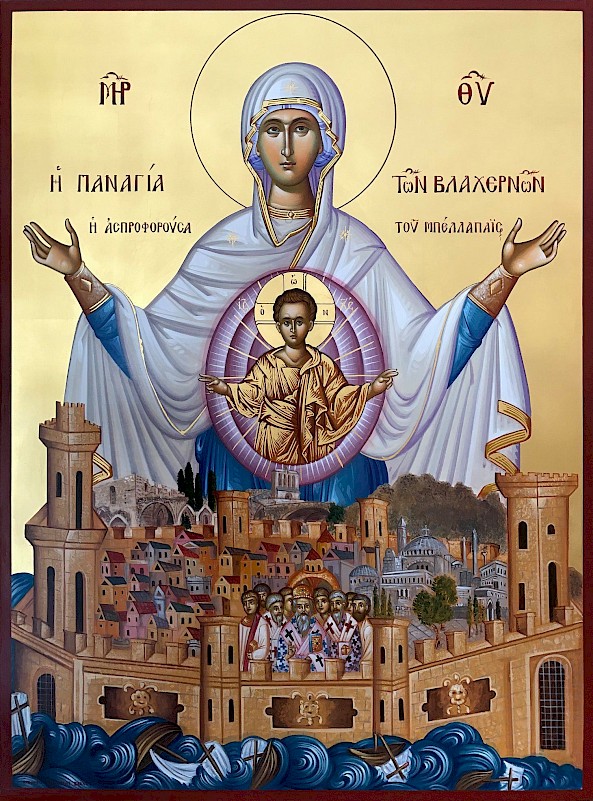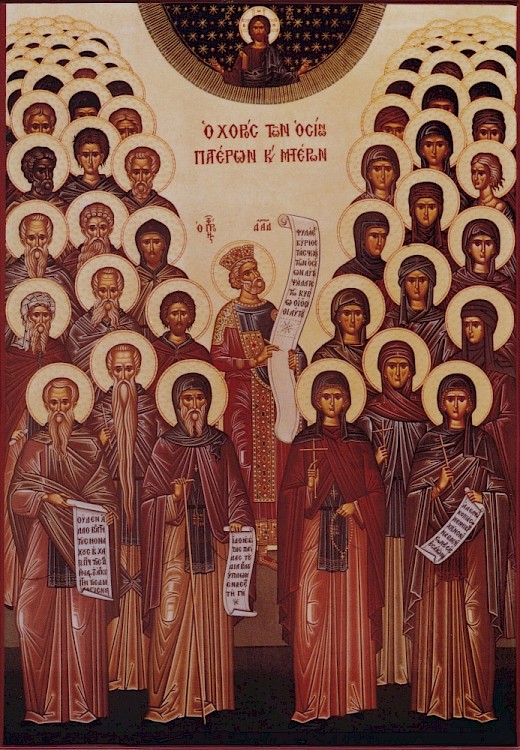
Larger image viewed by clicking on thumbnail.
On this day, the fifth Sunday of Great Lent, we celebrate the memory of our holy and venerable Mother, Mary of Egypt.
The recorder of the life of this wonderful saint is St. Sophronius, Patriarch of Jerusalem. A hieromonk, the elder Zossima, had gone off at one time during the Great Fast on a twenty-days’ walk into the wilderness across the Jordan. He suddenly caught sight of a human being with a withered and naked body and with hair as white as snow, who fled in its nakedness from Zossima’s sight. The elder ran a long way, until this figure stopped at a stream and called, “Father Zossima, forgive me for the Lord’s sake. I cannot turn around to you, for I am a naked woman. ” Then Zossima threw her his outer cloak, and she wrapped herself in it and turned around to him. The elder was amazed at hearing his name from the lips of this unknown woman. After considerable pressure on his part, she told him the story of her life.
06.04.2025Read more

Larger image viewed by clicking on thumbnail.
On this day, the Saturday of the fifth week of Great Lent, we celebrate the Akathist Hymn of our Most Holy Lady Theotokos and Ever-Virgin Mary.
In 626, when Heraclius (610-41) held the imperial authority of the Romans[1], Chozroes, the king of the Persians, seeing that Roman resources had been extremely depleted by the previous emperor, Phocas the Tyrant (602-10), sent one of his satraps named Sarvaros with many thousands of troops in order to subjugate the entire East to himself. Prior to this, Chozroes had captured one hundred thousand Christians whom the Jews bought and killed. The chief satrap Sarvaros ravaged the entire East and even reached as far as Chrysopolis, which is now called Skoutarion. Emperor Heraclius, being destitute of public funds, converted the sacred vessels of the churches into currency, promising to later replace them with more and finer ones. And thus, crossing the Black Sea with his ships, he invaded the regions of Persia, which he vanquished, utterly defeating Chozroes with his army. Shortly thereafter, Chozroes' son Seiroes rebelled against his father and killed him; he assumed authority and made peace with Emperor Heraclius.
03.04.2025Read more

One old staretz, living in a secluded wilderness, fell into despair from tempting doubts – is he striving correctly, and is there hope that his labors will be crowned in the end with success. The staretz sat with head hung down; his heart ached, but his eyes did not offer tears. At that moment an angel of the Lord appeared before him and said: “Why are you troubled, and why do such thoughts enter your heart? You are not the first, and you are not the last to walk this path. Many have passed it, many are walking it, and many will yet pass beyond it to the bright dwelling – places of heaven. Let us go – I will show you various paths, by which the sons of men walk, and where they lead.
The staretz got up and followed the angel; but he had hardly gone several steps when unto his spiritual eyes a wondrous vision was revealed. He saw to his left a thick darkness, like an impenetrable wall, in the midst of which was heard a clamor, anxiety and commotion. Looking carefully into the darkness he saw a wide river, along which waves moved back and forth, to the right and left – and every time that a wave flashed before the staretz, someone distinctly said to him: “this is the wave of unbelief, of carelessness, coldness; this is lack of mercy, lust, bribery; these are comforts, amusements, envyings, discord; and this is drunkenness, uncleanness, laziness, infidelity of spouses” and so forth – and every wave turned over a countless number of people lifting them out of the river and again plunging them into its depths. In horror the staretz cried out: “Lord! Can it be that all these people will die, and there is no hope of salvation for them?” The angel said to him: “Look further, and you will see the mercy and truth of God.”
31.03.2025Read more

On this day, the fourth Sunday of Great Lent, we commemorate our venerable Father among the saints, St. John of Sinai, the author of The Ladder of Divine Ascent.
No one knows the birthplace or parentage of our venerable Father John of Sinai. In his youth, at the age of sixteen, he came to the wilderness of Sinai and dwelt under the guidance of Abba Martyrius.
When Abba Martyrius tonsured our venerable Father John at the age of twenty, he took him and went to that pillar of the wilderness, Abba John the Sabbaite in the wilderness of Gouda where he had with him his disciple Stephen the Cappadocian. When the Sabbaite elder saw them, he arose and took water, poured it into a small basin, washed the feet of the disciple (the young John) and kissed his hand; but he did not wash the feet of Abba Martyrius his superior. Abba Stephen was scandalized by the situation. After the departure of Abba Martyrius and his disciple, Abba John noticed that his own disciple was greatly perplexed and said to him, “Why are you so troubled? Believe me, I do not know who the boy is, but today I received the abbot of Sinai and washed his feet.” After forty years, he did indeed become the abbot according to the prophecy of the elder.
30.03.2025Read more

On n this day, the third Sunday in Great Lent, we celebrate the veneration of the precious and Life-giving Cross.
As we have “crucified the flesh with its passions and desires” (Gal. 5:24), and will have mortified ourselves during these forty days of the Fast, the precious and Life-giving Cross is now placed before us to refresh our souls and encourage us who may be filled with a sense of bitterness, resentment, and depression. The Cross reminds us of the Passion of our Lord, and by presenting to us His example, it encourages us to follow Him in struggle and sacrifice, being refreshed, assured, and comforted. In other words, we must experience what the Lord experienced during His Passion – being humiliated in a shameful manner. The Cross teaches us that through pain and suffering we shall see the fulfillment of our hopes: the heavenly inheritance and eternal glory.
23.03.2025Read more

Lark Buns (Zhavoronki) Recipe for the 40 Martyrs of Sebaste These lark buns are traditionally baked in Russia each year to celebrate the Forty Martyrs of Sebaste. There are forty buns to celebrate each of the forty martyrs. The larks are the first bird to arrive in Russia each spring, and the feast day of the Forty Martyrs falls during Lent, so the buns also celebrate the arrival of spring.
1st Recipe
These "larks" are not sourdough like the ones referred to in the Siberian cookbook article. However, they are good. If readers have any recipes for these or other foods which are associated with the Church calendar, such as the "crosses" made for the Feast of the Exaltation of the Holy Cross, please send them in so that we can share them.
21.03.2025Read more

On this day, the second Sunday of Great Lent, we celebrate the memory of our Father among the saints, Gregory Palamas, Archbishop of Thessalonica and Wonder-worker.
Our holy father Gregory, the son of the Divine and unwaning Light, true servant of the true God and initiate of His wondrous mysteries, was born in the imperial city of Constantinople. His parents were noble and renowned persons who took care that he be taught both the secular sciences and divine wisdom and that he learn every virtue.
Gregory’s father reposed while the saint was still of a tender age; but his mother continued to rear him and his brothers and sisters in the law of the Lord, instructing them in the divine Scriptures and in the rules of good conduct. She arranged for them to be taught by learned teachers, and thus her son acquired much knowledge. The youth was by nature diligent and possessed a keen mind, and in a short time he became acquainted with every branch of philosophy.
Gregory disdained everything worldly as a deceptive dream – and wishing to cleave to God, the well-spring of all wisdom – at the age of twelve resolved to take up the monastic life. He revealed his intention to his pious mother, and although she was saddened at first, she gave her consent. In time, she came to rejoice in the Lord over Gregory’s desire and decided to follow him in embracing the monastic life; moreover, with God’s help, she persuaded all her other children to do likewise. Thus she could repeat the words of the prophet, “‘Behold, I and the children which You have given me’ (Is. 8:18) shall follow after You, О Lord.”
16.03.2025Read more

On this day, the first Sunday of Great Lent, we celebrate the restoration of the holy and venerable icons by the ever-memorable rulers of Constantinople, the Emperor Michael and his mother, the Empress Theodora, during the patriarchate of St. Methodius the Confessor.
It was with God’s permission that when St. Germanos (comm. May 12) had taken up the rudder of the Church, Leo the Isaurian (717-41) seized the scepter of the empire after having been a mule driver and manual laborer. The Patriarch was summoned immediately to hear the Emperor say, “In my opinion, Bishop, the holy images are no different from idols; therefore, I command that they be removed from among us as soon as possible. If it should be the case that they are the true forms of the saints, however, then at least see that they be hung up high so that we, who are stained by sin, may not soil them with our kisses.”
The Patriarch sought to turn the Emperor away from such hatred, saying, “God forbid, Emperor, that you should rage against the holy images, for we hear that some have nicknamed you the “One Who Plasters Over.”
09.03.2025Read more

On this day, Cheesefare Sunday[1], we commemorate the banishment of Adam, the First Creature, from the Paradise of Delight.
Our Holy Fathers appointed this commemoration before the beginning of Great Lent to demonstrate how beneficial the medicine of fasting is to human nature and how shameful are gluttony and disobedience by an example of the results of each. They set before us the example of Adam, the first formed man. Skipping over the detailed account of the innumerable things made for him in the world, they give a clear, case-in-point demonstration of how many evils he suffered – and hence introduced into our nature – from neglecting to fast for only a short time. Furthermore, they show that the first precept of God given to mankind was the ideal of fasting. By not keeping this precept but yielding instead to his stomach, or rather to the serpent-deceiver by the agency of Eve, Adam not only failed to become God, but he also brought death upon himself and communicated this sickness to the entire human race. In order to remove the first Adam’s indulgence, the Lord fasted forty days, thus obeying the commandment of fasting. This was the origin of the forty-day Fast of Great Lent. It was instituted by the Holy Apostles so that, if by means of Great Lent we keep the Fast, unlike Adam who did not, we might again enjoy the incorruptibility that he lost.
02.03.2025Read more

On this day we commemorate all the holy men and women who have shone forth in the ascetic life.
The God-bearing Fathers, having made us ready for the course of the Fast by gently instructing us by means of the two preceding Sundays, have thus led us away from luxury and satiety. They have instilled in us the fear of the future Judgment and purified us in advance – as is right – by means of Cheesefare week. Furthermore, they have wisely inserted the two intervening weeks of partial fasting so as to prepare us little by little for the full fasting which will begin next Monday.
01.03.2025Read more










